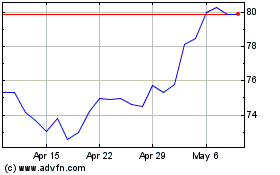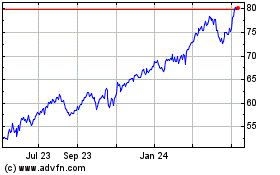Insurers' Earnings a Mixed Bag in First Quarter with Coronavirus Impact
May 05 2020 - 7:25PM
Dow Jones News
By Leslie Scism
Three of the nation's biggest insurers on posted first-quarter
earnings revealing wide-ranging effects of Covid-19, including a
surge in business-interruption claims, poorer investment results
and an auto-policy windfall.
The insurers' first-quarter earnings only reflected the opening
weeks of the world-wide spread of the coronavirus. All cautioned
that the second quarter would be more revealing of the pandemic's
impact.
Global carrier American International Group Inc. posted a 91%
decline in its widely watched "adjusted pretax income" to $172
million from $1.85 billion in the year-earlier quarter. Those
earnings, reported Monday afternoon were hurt by lower investment
income, weather-related catastrophe costs and a boost to reserves
of $272 million on a pretax basis related to Covid-19 costs.
The Covid-19 reserve increase includes already received and
anticipated claims from policyholders under policies covering
travel cancellations and business interruptions, among other
things. Business-income claims have surged at many insurers,
stemming from shelter-at-home and lockdown directives that shut
down or limited the operations of restaurants, retailers and many
other private-sector operations across the U.S.
Operating income at Prudential, which has an asset-management
unit with $1.3 trillion under management in addition to its
life-insurance businesses, declined 25% to $939 million, the
company said Tuesday afternoon. Prudential said "market turbulence
related to the pandemic adversely impacted" the results. Ultralow
interest rates, part of the fallout from Covid-19, pressured its
profit on some insurance products, the insurer said. Earnings in
Prudential's group-insurance unit sank with lower variable
investment income.
But Allstate's adjusted net income rose 47% to $1.14 billion.
The insurer benefited from sharply lower catastrophe costs compared
with the year-earlier period. Allstate said its underwriting profit
from its car and home policies jumped 92% to $1.34 billion.
Allstate's results, reported Tuesday afternoon, also included
some of the impact of reduced driving from people hunkered down in
their homes under the stay-at-home directives, but more of that is
expected to be reflected in the second-quarter results. Those big
drops in mileage led Allstate, and many other big insurers, to
announce plans in April for premium refunds to policyholders,
either to be dispatched immediately or as credits on their April
and May bills.
"Miles driven has started to pick back up since the middle of
April, but it still isn't anywhere close to where it was" before
the pandemic, Allstate Chief Executive Tom Wilson said. At one
point in some states, mileage was down 50% to 60%, he said.
The insurers' results come as at least one study suggests the
still-unfolding crisis could top Hurricane Katrina in 2005 as the
costliest disaster to insurers. Brokerage Willis Towers Watson said
in a May 1 report that U.S. and U.K. losses to property-casualty
insurers from Covid-19 could hit $32 billion in a moderate scenario
and $80 billion in a severe one. Katrina cost insurers and the U.S.
flood-insurance program more than $70 billion in today's dollars,
according to trade group Insurance Information Institute.
AIG CEO Brian Duperreault told analysts in an earnings call
Tuesday that Covid-19 "will be the single largest [catastrophe]
loss the industry has ever seen." He said AIG "was in a strong
financial position before this crisis began and remains in a strong
financial position."
AIG "will continue to be laser focused on actions to further
strengthen" its capital and access to cash, Mr. Duperreault said.
In March, AIG made a partial drawdown of $1.3 billion from a
revolving credit facility, the insurer said. That was one of
numerous efforts by numerous property-casualty and life insurers to
build up funds to potentially tap into, analysts said.
The big question commercial insurers like AIG face is the
potential exposure from property policies that include coverage for
business interruption. Industrywide, litigation over disputed
coverage is mounting in courts, and restaurants and other small
businesses are seeking help from state and federal lawmakers to try
to force insurers to pay out. For their part, most insurers cite
pandemic, virus and other exclusions written into their
business-interruption policies.
AIG President Peter Zaffino told analysts in the earnings call
that "the overwhelming majority" of AIG's property policies
"contain exclusions for losses related to viruses" and have other
terms that preclude Covid-19 business-interruption claims. "We are
confident these exclusions and related terms and conditions will be
upheld should they be challenged," he said.
Besides business-interruption and travel claims, AIG's $272
million reserve boost addresses claims on event-cancellation
contracts, trade credit, workers' compensation and policies
reinsured for other carriers by its Validus Re unit, it said.
Wall Street analysts follow insurers' adjusted earnings, rather
than net income, because they exclude realized capital gains and
losses and other items considered nonrecurring. Allstate's net
income fell 59% from the year-earlier quarter to $513 million. It
said its higher underwriting income was more than offset by net
realized capital losses and pension and other postretirement
remeasurement losses.
Write to Leslie Scism at leslie.scism@wsj.com
(END) Dow Jones Newswires
May 05, 2020 19:10 ET (23:10 GMT)
Copyright (c) 2020 Dow Jones & Company, Inc.
American (NYSE:AIG)
Historical Stock Chart
From Mar 2024 to Apr 2024

American (NYSE:AIG)
Historical Stock Chart
From Apr 2023 to Apr 2024
